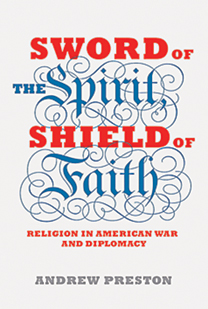REVIEW: Sword of the Spirit, Shield of Faith: Religion in American War and Diplomacy.
Book by Andrew Preston
Share
 In the increasingly post-Christian societies of the modern West, the United States stands out for the role religion plays in the nation’s foreign policy. And not just in rhetoric, genuine or hypocritical, which is always a tempting conclusion for those attuned to the thread of naked self-interest that runs through every nation’s diplomacy. The greatest service provided by Preston’s magisterial account of the role of faith in creating the concept of American exceptionalism—the U.S. as a shining city on a hill called upon to set the world to rights—is to show how seamlessly President George W. Bush’s response to 9/11, in action and words, fit into American tradition.
In the increasingly post-Christian societies of the modern West, the United States stands out for the role religion plays in the nation’s foreign policy. And not just in rhetoric, genuine or hypocritical, which is always a tempting conclusion for those attuned to the thread of naked self-interest that runs through every nation’s diplomacy. The greatest service provided by Preston’s magisterial account of the role of faith in creating the concept of American exceptionalism—the U.S. as a shining city on a hill called upon to set the world to rights—is to show how seamlessly President George W. Bush’s response to 9/11, in action and words, fit into American tradition.
Within the crucible of the Civil War even president Abraham Lincoln—the next thing to an atheist in his early years—became “increasingly and more conventionally spiritual,” Preston writes, as that war cemented what would become the U.S.’s two-pronged state religion: the duty of humanitarian intervention and America as God’s chosen nation. After the Spanish-American War of 1898, when the Philippines fell to the U.S., it was natural—and not, as many historians have claimed, insincere—for president William McKinley, one of the most devout men ever to sit in the Oval Office, to act as he did.
After sleepless nights pacing the White House, and hours on his knees in prayer, McKinley believed he grasped God’s plan. His free republic had to become an imperial power: “There was nothing left for us to do but to take them all, and to educate the Filipinos and uplift and civilize and Christianize them, and by God’s grace do the very best we could by them.” When Bush, in his 2003 state of the union address laying out the case for the invasion of Iraq, declared, “The liberty we prize is not America’s gift to the world, it is God’s gift to humanity,” he was not revealing himself as a premodern throwback—as Preston, a British scholar, then thought—but binding himself tightly to the oldest pillar of American foreign policy.